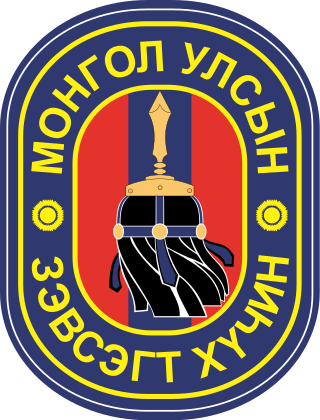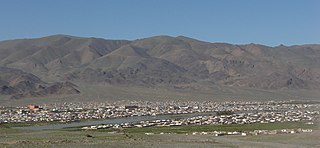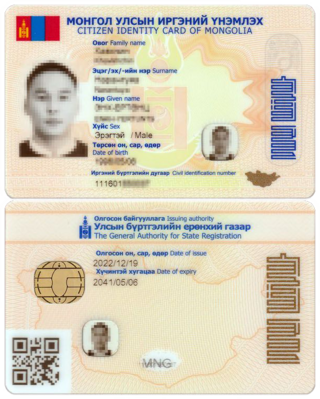Additional legislation and bodies
| | This section is empty. You can help by adding to it. (June 2020) |
The judiciary of Mongolia is made up of a three-tiered court system (first instance, appellate, supreme court) divided into three branches (civil, criminal, administrative cases). For questions of constitutional law there is a separate constitutional court. Besides there are forms of alternative dispute resolution.
First instance court types are: [1]
The Bayan-Ölgii courts of first instance bear alternative Kazakh names (Сұмын аралық азаматтық/Сұмын аралық қылмыстық/Әкімшілік істер алғашқы сатылы сот). [3]
Appellate court types are: [1]
The highest court in Mongolia is the Supreme Court of Mongolia (Улсын Дээд Шүүх), [7] established in 1927. There are chambers for civil, criminal and administrative cases. The court hears general appeals from courts of lower instance as well as from the Constitutional Court in matters regarding the protection of law and human rights.
| | This section is empty. You can help by adding to it. (June 2020) |
The courts' procedure is governed by the Law on civil procedure, [8] the Criminal procedure law, [9] the Law on the execution of court decisions, [10] and the Law on administrative procedure. [11]
The Judicial General Council of Mongolia (Монгол Улсын Шүүхийн ерөнхий зөвлөл) [12] is to maintain the independence of the judiciary. [13] The status of judges is determined by a separate law. [14] The number of judges for each court is set by parliament. [15]
For commercial disputes there is among others the Mongolian International and National Arbitration Center (MINAC; Монголын Олон Улсын ба Үндэсний Арбитр), established in 1960 at the Mongolian National Chamber of Commerce and Industry (MNCCI). [16] [17] The Law on mediation and conciliation [18] provides for further forms of alternative dispute resolution.
Mongolia's highest court in constitutional matters is the Constitutional Court of Mongolia (Монгол Улсын Үндсэн хуулийн цэц). [19] It was established in 1992 and has its own procedural law. [20]

The Mongolian Armed Forces is the collective name for the Mongolian military and the joint forces that comprise it. It is tasked with protecting the independence, sovereignty, and territorial integrity of Mongolia. Defined as the peacetime configuration, its current structure consists of five branches: the Mongolian Ground Force, Mongolian Air Force, Construction and Engineering Forces, cyber security, and special forces. In case of a war situation, the Border Troops, Internal Troops, Judicial enforcement agency and National Emergency Management Agency can be reorganized into the armed forces structure. The General Staff of the Mongolian Armed Forces is the highest professional military management organization of the state military organization and operates independently from the Ministry of Defense, its government controlled parent body. Mongolian military day is celebrated on 18 March, similar to Defender of the Fatherland Day in Russia and PLA Day in China.

Buyant-Ukhaa International Airport, formerly called Chinggis Khaan International Airport from 2005 to 2020, is a semi-operational international airport serving Ulaanbaatar, Mongolia, situated 18 km (11 mi) southwest of the capital. Largely replaced by a new airport, it currently functions as a backup airport for the former, with a view to be used for flight training as well as for special, charter, and government flights.

Bayan-Ölgii is the westernmost of the 21 aimags (provinces) of Mongolia. The country's only Muslim and Kazakh-majority aimag, it was established in August 1940. Its capital is Ölgii.

The Civil Will–Green Party is a green liberal political party in Mongolia.

The current Constitution of Mongolia was adopted on 13 January 1992, put into force on 12 February, with amendments made in 1999, 2000, 2019 and 2023. The constitution established a representative democracy in Mongolia, enshrining core functions of the government, including the separation of powers and election cycle, and guaranteeing human rights including freedom of religion, travel, expression, private property. The document was written after the Mongolian Revolution of 1990, effectively dissolving the Mongolian People's Republic.

The Mongolian passport is a passport issued to Mongolian citizens for purposes of travel outside Mongolia. Mongolian citizens have visa-free or visa on arrival access to 62 countries and territories. Passports are issued by the General Authority for State Registration, an implementing agency of the Mongolian government.

Lesbian, gay, bisexual, and transgender (LGBT) people in Mongolia face legal and social challenges not experienced by non-LGBT people, though there have been substantial improvements since the 1990s. Homosexuality was criminalised in Mongolia in 1961 through its Criminal Code. Following the Mongolian Revolution of 1990 and the peaceful transition to a democracy, homosexuality was legalised and awareness about LGBT people has become more prevalent. Hate crimes on the basis of sexual orientation and gender identity result in additional legal penalties. Hate speech based on these two categories has been outlawed in the country since 1 July 2017. Households headed by same-sex couples are, however, not eligible for the same legal protections available to opposite-sex couples.

The Supreme Court of Mongolia is the highest court in the judicial system of Mongolia, and is generally the court of last resort for non-constitutional matters. It is established by Article 48(1) of the Constitution of Mongolia. The 1992 Constitution states in Article 50(1) that "the Supreme Court shall be the highest judicial organ".
Administrative courts in Mongolia. The 1992 Constitution of Mongolia says: "The judicial system shall consist of the Supreme Court, Aimag (provincial) and capital city courts, Sum (county), inter-sum and district courts in Mongolia. Specialized courts such as criminal, civil and administrative courts may be formed. The activities and decisions of the specialized courts shall not but be under the supervision of the Supreme Court". This is the origin of the administrative courts, the first ever and only specialized courts in Mongolia. On December 26, 2002 the State Great Khural passed the Law on establishment of administrative court along with the Law on procedure for administrative cases in accordance with Article 48 (1) of the Constitution. It took almost ten years to convince the State Great Khural to pass this law with enormous work of lawyers and scholars, and the support of international organizations. The law of Mongolia on procedure for administrative cases entered into force on June 1, 2004. It is divided into two sections: first – procedure for administrative tribunal(s) and higher administrative officials to pre-decide the original act based on the complaint submitted by citizen or legal entity, second – procedure for administrative courts.

The Judicial General Council of Mongolia is an organ of the Mongolian judiciary mandated by the Constitution of Mongolia to maintain the independence of the judiciary, represent the Mongolian judiciary and advise on the selection and removal of judicial officers.

The Ministry of Defence of Mongolia is a ministry of the Government of Mongolia. According to the Law on the Defence of Mongolia, the Ministry is responsible for developing Defence Policy, coordinating its political, economic, social, legal and military implementation, and exercise civilian control over the Mongolian Armed Forces. The current Minister Gürsediin Saikhanbayar was appointed in July 2020.
Butochiyn Tsog was a Mongolian politician and military leader in the Mongolian People's Republic from the 1950s up until 1985. He is credited with building Mongolian military strength in the 60s and 70s.
The Ministry of Justice and Internal Affairs of Mongolia, also referred to as the Ministry of Justice or the Ministry of Home Affairs, is a Mongolian government agency that upholds the principles of fairness and rule of law in Mongolia, and aims to create legal guarantees so that the federal government may ensure human rights and freedoms. The ministry carries out activities such as developing legal policy, public administration, financing and investment, treaties and cooperation, and internal auditing. It divides its security duties with the Ministry of Defense and the General Intelligence Agency.

The Chief of the General Staff of the Mongolian Armed Forces is the highest-ranking professional military leader in the Mongolian Armed Forces. The Chief of the General Staff carries out his duties under the governance of the Commander-in-Chief and serves as the principal advisor to him/her on military affairs. He/She is responsible for the implementation of operational orders and directives to maintain the combat readiness of the armed forces in peacetime. In wartime, the chief directs the military in accordance with the commander-in-chief.

The National Police Agency is an agency that is part of the Government of Mongolia and acts as a reserve force for the Armed Forces of Mongolia. It is currently an agency of the Mongolian Ministry of Justice and Home Affairs and is the primary law enforcement organization in Mongolia. The Police is assisted by the Directorate of the Internal Troops of Mongolia.
The Mayor of Ulaanbaatar is head of the executive branch of the political system of the city of Ulaanbaatar, Mongolia. The mayor's office administers all city services and public agencies, and enforces all city laws. There have been 35 mayors of Ulaanbaatar.

The State Seal of Mongolia is one of the National symbols of Mongolia and is used as the official seal of state, with President of Mongolia as its holder. The state seal is affixed on each page of the original text of the Constitution of Mongolia, on the first page of the original text of Mongol laws, international agreements ratified by the State Great Khural, and State Great Khural decisions on establishing or terminating diplomatic relations between Mongolia and foreign countries. During presidential inauguration ceremonies, the outgoing president hands over the state seal to the newly elected president.

The Citizen Identity Card of Mongolia is a compulsory identification document issued to Mongolian citizens over the age of 16. The card's usage is regulated by the General Law on State Registration and the Law on Civil State Registration.